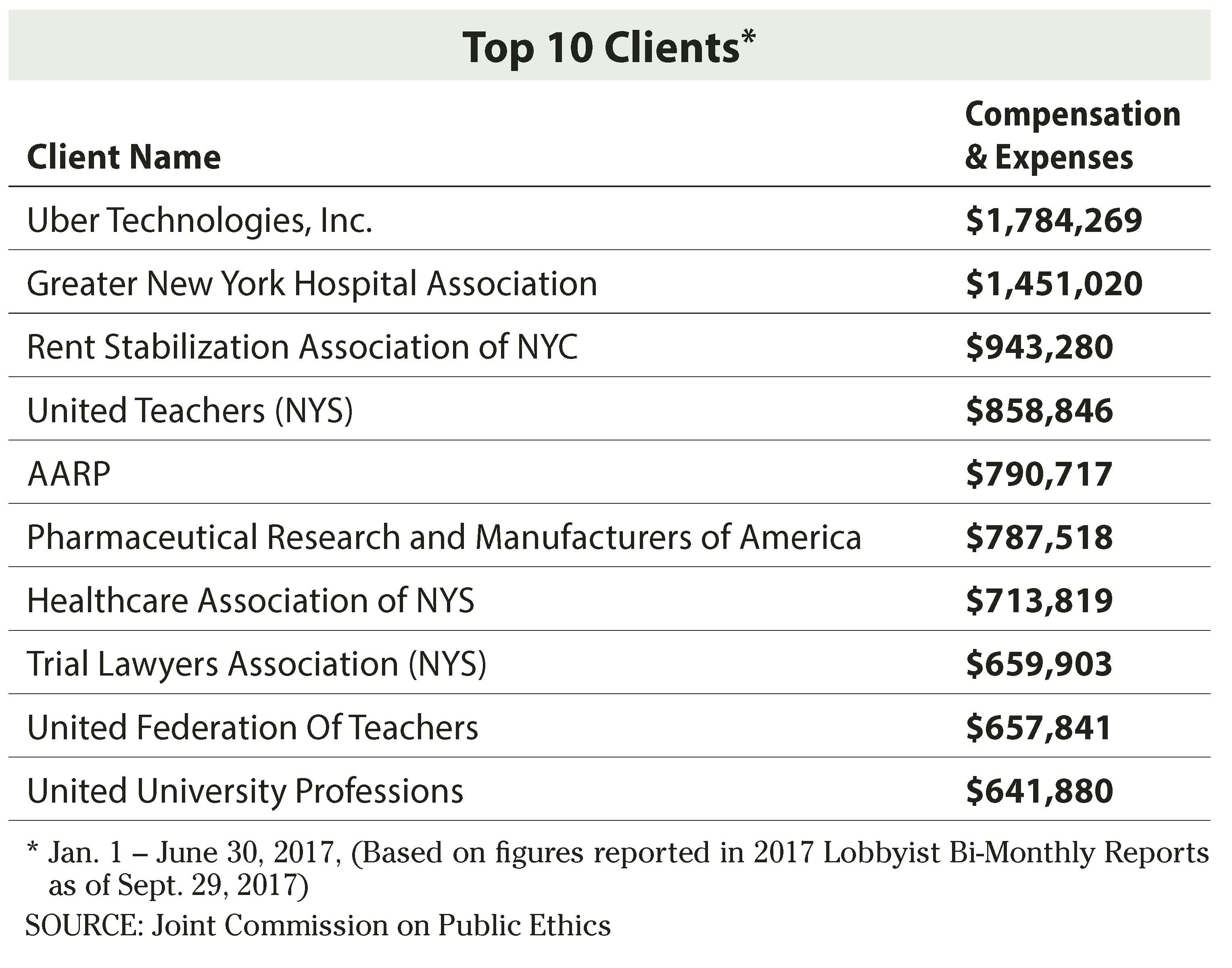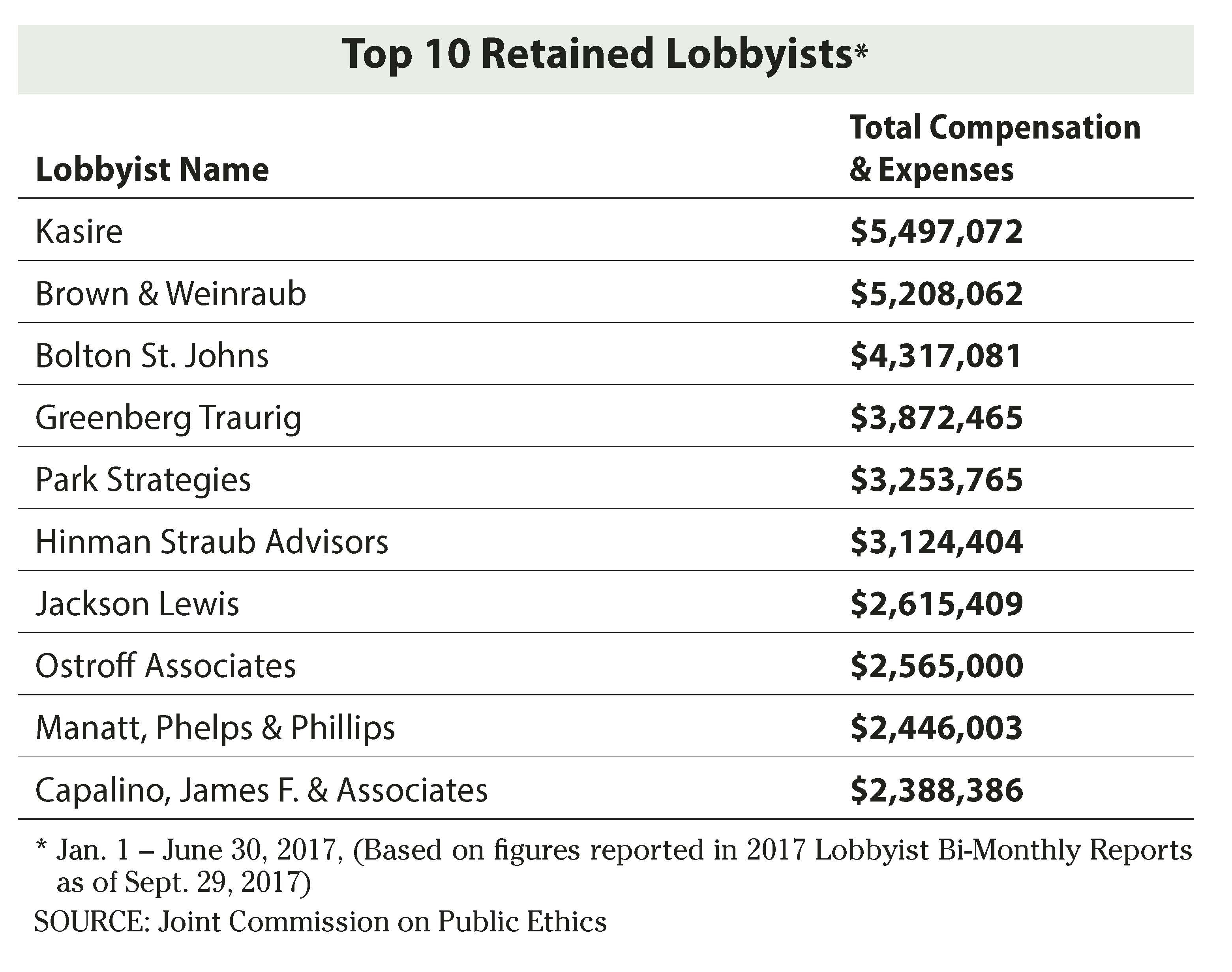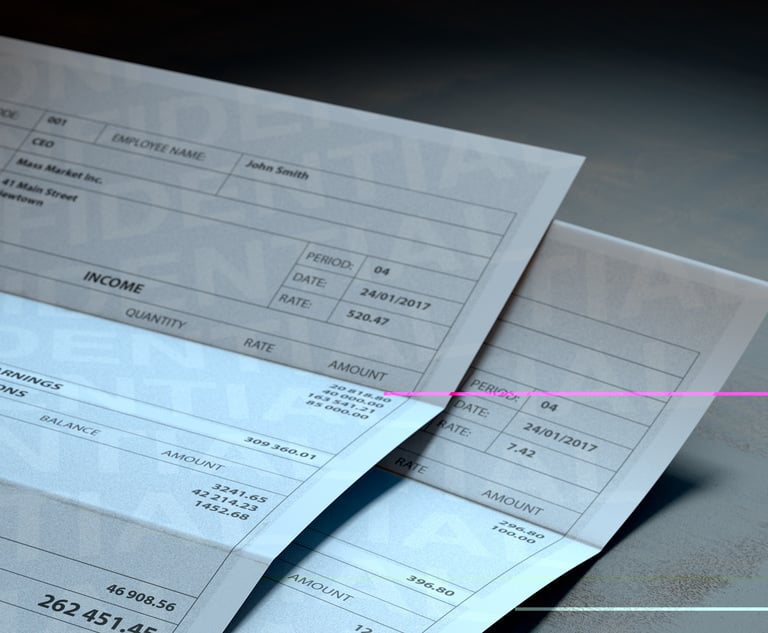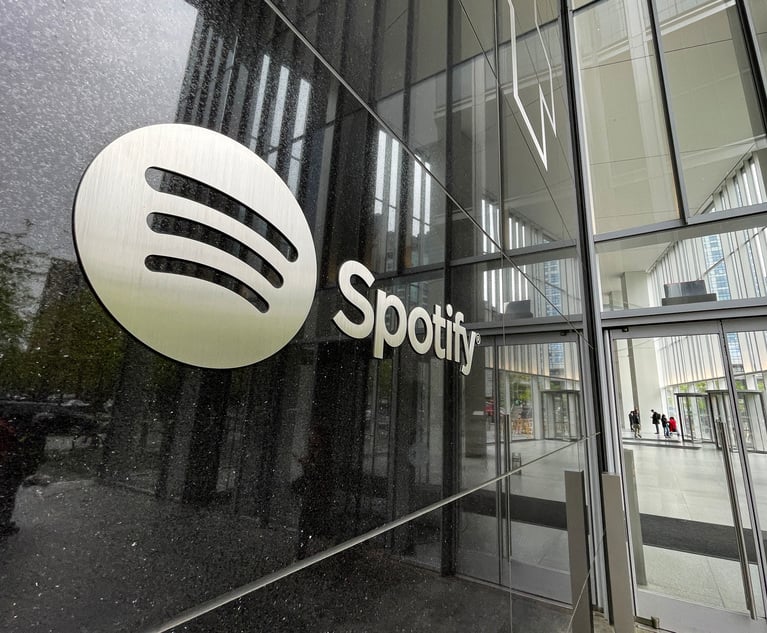Uber Tops Spending on Lobbying in New York State
Uber Technologies Inc. was New York's largest lobbying spender in the first half of 2017, according to a report issued by the state's Joint Commission on Public Ethics released yesterday. Other big spenders included the Greater New York Hospital Association and the Rent Stabilization Association.
October 19, 2017 at 03:53 PM
4 minute read

ALBANY – Uber Technologies Inc. was New York's largest spender on lobbying in the first half of 2017, according to a report issued by the state's Joint Commission on Public Ethics released yesterday.
Between January and June of this year, the ride-hailing services company spent $1.8 million on lobbying, as the New York Law Journal reported in August (NYLJ Aug. 21), making it the top spender on lobbyists and lobbying expenses in the state. Uber had been advocating to allow ride-hailing apps to operate outside of New York City, which was ultimately enacted in the state budget in April.
In June, New York's ethics and lobbying regulators fined Uber a record $98,000 for underreporting how much it had spent on lobbying, failing to report $6.3 million in lobbying expenses in 2015 through 2016 on its biennial registration report, the Joint Commission on Public Ethics said at the time.
“An overwhelming majority of of New Yorkers support ride-sharing and elected officials, small business owners, clergy members and law enforcement officials had been clamoring for the service for years. We were committed to ensuring that the voices of New Yorkers were heard over those of the special interests,” said Alix Anfang, a spokeswoman for Uber, in a statement released Wednesday.
A provision in a new budget bill adopted last spring also allows testing of autonomous vehicles under a one-year pilot program , which Uber has been testing in other cities including Pittsburgh and San Francisco.
All told, the report released Wednesday afternoon shows that clients who hired lobbying firms spent $121.2 million on their services in the first half of the year, an increase of roughly $1 million from the same period last year. The Greater New York Hospital Association, a trade group that represents hospitals statewide and has been lobbying against extending the statute of limitations on medical malpractice lawsuits and for more hospital funding, came in second after Uber, spending $1.45 million. The Rent Stabilization Association, which represents roughly 25,000 landlords in New York City in matters involving rent control, spent $943,280 during the first half of the year and the New York State United Teachers union spent $858,846.
The top 10 lobbying firms in the state received nearly $35.3 million in compensation and reimbursed expenses, roughly $200,000 less than the first six months of 2016. New York City-based Kasirer, whose president, Suri Kasirer, is a top Democratic consultant, led the group with almost $5.5 million in total earnings and 159 clients. Brown & Weinraub, a government relations and full service law firm in New York City and Albany, which has 141 clients, came in second with $5.2 million and Bolton-St. Johns, a public relations firm whose senior partner—Giorgio DeRosa—is the father of the secretary to Gov. Andrew Cuomo, received $4.3 million in total compensation and expenses.
Kasirer, in an email, said that the firm's strategy is to provide clients with “short and longer term goals and “outline a strategy to achieve these goals.”
“For many of our clients it's legislative, policy, procurement or government funding and for some it's just helping them understand how government and politics work and navigating through various government agencies to solve complex technical challenges,” she said.
Miami-based law firm Greenberg Traurig earned $3.87 million in the first six months of 2017, followed by the lobbying firm founded by former U.S. Sen. Al D'Amato, Park Strategies, which earned $3.25 million. Albany-based law firm Hinman Straub earned $3.12 million. Jackson Lewis, which expanded its lobbying practice last year, entered the top 10 list, earning $2.61 million in the first half of 2017. Albany-based Ostroff Associates earned $2.56 million and Los Angeles-based law firm Manatt, Phelps & Phillips earned $2.44 million, and New York City-based Capalino + Co. earned $2.38 million for the first half of the year.
Of the $121 million spent on lobbying, $107 million went to cover the cost of compensation for in-house and retained lobbyists, according to data collected by the Joint Commission on Public Ethics. Roughly $5.3 million was spent on advertising and an additional $431,000 on events.


This content has been archived. It is available through our partners, LexisNexis® and Bloomberg Law.
To view this content, please continue to their sites.
Not a Lexis Subscriber?
Subscribe Now
Not a Bloomberg Law Subscriber?
Subscribe Now
NOT FOR REPRINT
© 2025 ALM Global, LLC, All Rights Reserved. Request academic re-use from www.copyright.com. All other uses, submit a request to [email protected]. For more information visit Asset & Logo Licensing.
You Might Like
View All
Five Years After Vega Much Remains Unsettled in Pay Frequency Litigation

Spotify GC Steps Down, Opts to 'Step Away From Full-Time Corporate Life'
2 minute read
Dechert Sues Former Attorney For Not Returning Compensation

Trending Stories
- 1Federal Judge Pauses Trump Funding Freeze as Democratic AGs Launch Defensive Measure
- 2Class Action Litigator Tapped to Lead Shook, Hardy & Bacon's Houston Office
- 3Arizona Supreme Court Presses Pause on KPMG's Bid to Deliver Legal Services
- 4Bill Would Consolidate Antitrust Enforcement Under DOJ
- 5Cornell Tech Expands Law, Technology and Entrepreneurship Masters of Law Program to Part Time Format
Who Got The Work
J. Brugh Lower of Gibbons has entered an appearance for industrial equipment supplier Devco Corporation in a pending trademark infringement lawsuit. The suit, accusing the defendant of selling knock-off Graco products, was filed Dec. 18 in New Jersey District Court by Rivkin Radler on behalf of Graco Inc. and Graco Minnesota. The case, assigned to U.S. District Judge Zahid N. Quraishi, is 3:24-cv-11294, Graco Inc. et al v. Devco Corporation.
Who Got The Work
Rebecca Maller-Stein and Kent A. Yalowitz of Arnold & Porter Kaye Scholer have entered their appearances for Hanaco Venture Capital and its executives, Lior Prosor and David Frankel, in a pending securities lawsuit. The action, filed on Dec. 24 in New York Southern District Court by Zell, Aron & Co. on behalf of Goldeneye Advisors, accuses the defendants of negligently and fraudulently managing the plaintiff's $1 million investment. The case, assigned to U.S. District Judge Vernon S. Broderick, is 1:24-cv-09918, Goldeneye Advisors, LLC v. Hanaco Venture Capital, Ltd. et al.
Who Got The Work
Attorneys from A&O Shearman has stepped in as defense counsel for Toronto-Dominion Bank and other defendants in a pending securities class action. The suit, filed Dec. 11 in New York Southern District Court by Bleichmar Fonti & Auld, accuses the defendants of concealing the bank's 'pervasive' deficiencies in regards to its compliance with the Bank Secrecy Act and the quality of its anti-money laundering controls. The case, assigned to U.S. District Judge Arun Subramanian, is 1:24-cv-09445, Gonzalez v. The Toronto-Dominion Bank et al.
Who Got The Work
Crown Castle International, a Pennsylvania company providing shared communications infrastructure, has turned to Luke D. Wolf of Gordon Rees Scully Mansukhani to fend off a pending breach-of-contract lawsuit. The court action, filed Nov. 25 in Michigan Eastern District Court by Hooper Hathaway PC on behalf of The Town Residences LLC, accuses Crown Castle of failing to transfer approximately $30,000 in utility payments from T-Mobile in breach of a roof-top lease and assignment agreement. The case, assigned to U.S. District Judge Susan K. Declercq, is 2:24-cv-13131, The Town Residences LLC v. T-Mobile US, Inc. et al.
Who Got The Work
Wilfred P. Coronato and Daniel M. Schwartz of McCarter & English have stepped in as defense counsel to Electrolux Home Products Inc. in a pending product liability lawsuit. The court action, filed Nov. 26 in New York Eastern District Court by Poulos Lopiccolo PC and Nagel Rice LLP on behalf of David Stern, alleges that the defendant's refrigerators’ drawers and shelving repeatedly break and fall apart within months after purchase. The case, assigned to U.S. District Judge Joan M. Azrack, is 2:24-cv-08204, Stern v. Electrolux Home Products, Inc.
Featured Firms
Law Offices of Gary Martin Hays & Associates, P.C.
(470) 294-1674
Law Offices of Mark E. Salomone
(857) 444-6468
Smith & Hassler
(713) 739-1250






